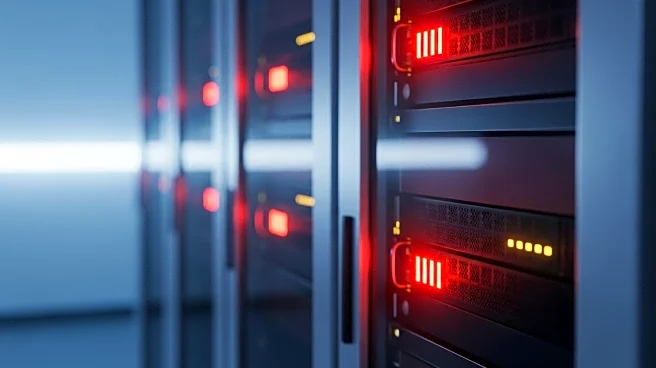What's Happening?
Cloudflare Inc., a leading cybersecurity firm based in San Francisco, experienced a significant service disruption due to a self-inflicted distributed denial-of-service (DDoS) attack. The incident was triggered by a software bug within Cloudflare's systems, which inadvertently turned its protective mechanisms against its own infrastructure. This resulted in widespread outages affecting websites, applications, and enterprise networks globally. The issue originated from a routine update to Cloudflare's API layer, where a minor code change led to an unforeseen interaction with existing protocols, causing an exponential surge in internal requests. This self-DDoS overwhelmed servers, leading to intermittent outages lasting approximately two hours before the faulty code was isolated and rolled back.
Why It's Important?
The incident highlights the vulnerability of cybersecurity firms to internal errors, even as they successfully fend off external threats. Cloudflare's recent triumph in blocking a massive DDoS attack underscores its capabilities, yet the self-triggered outage reveals the risks associated with complex code dependencies and human error. This event serves as a cautionary tale for the industry, emphasizing the need for rigorous testing and monitoring of internal systems. The outage briefly impacted Cloudflare's reputation for reliability, providing competitors like Akamai Technologies Inc. an opportunity to showcase their stability. Analysts suggest that as cybersecurity firms integrate more AI-driven tools, the potential for similar incidents could increase, necessitating enhanced safeguards.
What's Next?
In response to the incident, Cloudflare has committed to implementing machine learning models to better distinguish between legitimate internal operations and anomalous patterns. The company plans to enhance simulation testing for API changes and improve internal traffic monitoring. These measures aim to prevent recurrence and set new standards for internal resilience in the cybersecurity sector. Cloudflare's leadership is focused on rebuilding trust and reinforcing its position as a reliable provider, while industry observers watch for potential shifts in market dynamics as competitors capitalize on the situation.
Beyond the Headlines
The self-DDoS incident underscores the double-edged sword of innovation in cybersecurity, where rapid deployment cycles can lead to 'friendly fire' events. It highlights the importance of balancing technological advancement with robust auditing processes to ensure digital infrastructure remains secure. As Cloudflare rebounds, the event may drive broader discussions on the ethical and operational challenges faced by cybersecurity firms in maintaining both external protection and internal resilience.









